House & Commercial Repiping Services
Sometimes, a plumbing repair isn’t enough. Or you may find yourself paying for the same repairs over and over with increasing frequency.
When this happens, it may be time for repiping — nothing less than a rebuild of your plumbing system.
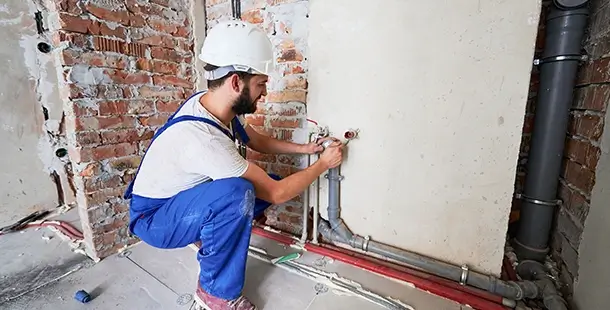
What’s Repiping?
As the name suggests, repiping replaces existing pipes in a home or business, including water pipes and sewer lines. A complete repiping involves the main line and smaller branches connecting to it. A partial repiping involves only the most damaged or oldest pipes.
Age is the most common reason for repiping. Over the years, pipes corrode, weaken, and develop leaks. Tree roots or rodents may damage an entire section of pipe beyond repair.
Another reason for repiping is home or business renovation, which exposes piping in the walls and around fixtures. Easy access to pipes lets you upgrade them to save money and trouble in the long run.
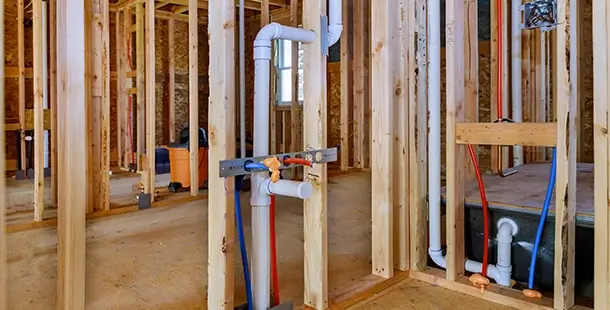
Benefits of Repiping
- Improved water quality: New pipes mean clean, fresh water for drinking, cooking, and bathing.
- Increased water pressure: You’ll finally be able to shower and wash your dishes simultaneously! Please wash your dishes in the dishwasher, not the shower enclosure.
- Fewer leaks: Leaks will be a thing of the past with new, correctly configured pipes.
- Long-term savings: The initial investment for repiping is higher than a plumbing repair, but you’ll save money by not having to pay for repeated repairs.
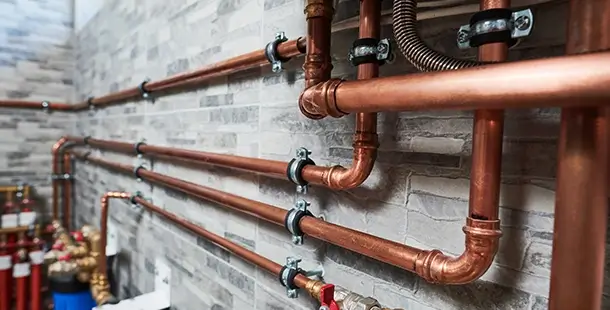
Signs You Need Repiping
- You’re paying for frequent plumbing repairs: The average lifespan of plumbing pipes is about 50 years.
- You have lead pipes: Lead is a toxic metal that can cause serious health problems.
- You have galvanized steel pipes: Galvanized steel pipes are coated with zinc to prevent corrosion. The zinc gradually wears away, and the steel begins to rust.
- Funny-tasting or smelly water: Corrosion in your pipes can make your water taste or smell bad.
- Discolored water: Brown, red, or yellow indicates corrosion.
- Low water pressure: Mineral buildup in your pipes leads to low water pressure.
- Discolored pipes: Brownish or yellowed pipes are probably corroded.
- Your pipes are leaking: If you have more than one leak in different areas of your home or business, your pipes may be on their last legs.
What Does Repiping Entail?
- We shut off the water supply to your home or business.
- We remove old pipes and install new ones.
- Copper, PEX (cross-linked polyethylene), and PVC (polyvinyl chloride) are the most common types of pipes installed. We use only copper because it’s the safest and most durable.
- Once the new pipes are in place, we connect them to your water supply and test for leaks.
- The entire process takes about two to three days, depending on the size and layout of your home or business.
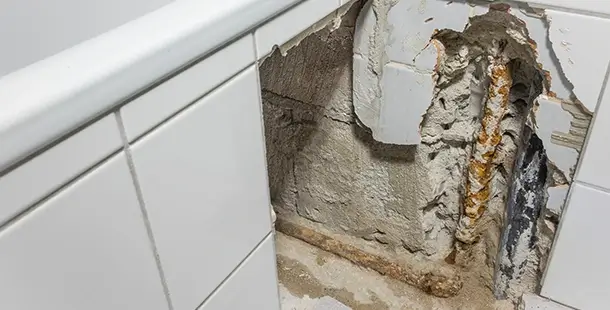
What about Toilets & Faucets?
If you’re repiping your home or business, it’s a good idea to upgrade your fixtures, too, including faucets, toilets, and showerheads. Low-flow fixtures can save considerable money on your water bill. They also help conserve California’s precious water supply.
Just like plumbing, fixtures don’t last forever. A faulty toilet will continue to cause problems, no matter how slick your new piping is.
How Much Does Repiping Cost?
The cost of repiping varies according to your home or business size, the type of pipes used, and whether you’re doing it yourself or hiring a professional.
Repiping is a big job, and it’s not something that most people are qualified to do themselves.
Call us for a free estimate for your repiping project. All Orange Coast plumbers are licensed, certified, and insured.
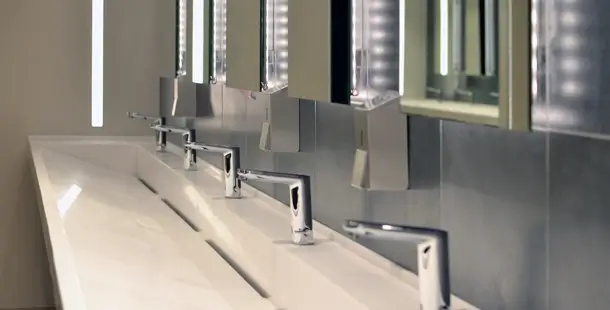
We Install Only Copper Pipes
CPVC, PEX, and other plastic pipes are susceptible to rodent damage and can leach chemicals into your water.
Copper pipes, on the other hand, are durable and long-lasting. They’re less likely to break during an earthquake.
Copper piping costs more initially but pays for itself over the years. One desperate homeowner who called us had repiped his home three times in just over a decade due to pests! Copper repiping solved the problem — no rat will chew through metal.
Other Upgrades to Consider
As long as you’re repiping your home or business, you might consider some other upgrades.
- Water softeners remove minerals from hard water, extending the life of plumbing and fixtures and saving you money on repairs.
- Reverse osmosis systems remove impurities from your water, making it healthier to drink. They also extend the life of your plumbing.
- Tankless water heaters provide an endless supply of hot water on demand. They’re more efficient than traditional tank water heaters and take up less space.
- Low-flow fixtures save water and money. They’re required in new construction but can also be retrofitted to existing homes and businesses.
- Smart water shutoff can save you thousands of dollars in damages by automatically shutting off the water when a leak is detected.
Please call to discuss your options. We’re happy to help you choose the upgrades right for you.
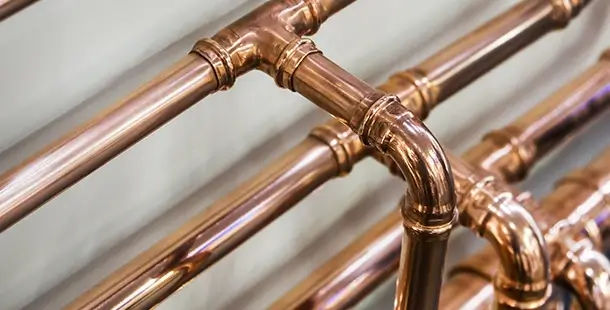
Frequently Asked Questions about Repiping
How is repiping done?
Our plumbers will shut off the water supply to your home or business, remove old pipes and install new ones. We use only copper pipes for safety and durability.
Once the new pipes are in place, we connect them to your water supply and test for leaks. The entire process takes about two days to a week, depending on the size and layout of your home or business.
What does a repipe include?
We remove old pipes and install new copper lines, connect the new piping to your water supply, test for leaks, and make any necessary adjustments. You can also choose to upgrade your plumbing fixtures.
How invasive is repiping a house?
Repiping is a major project that requires full access to your walls and floors. After the job is finished, we repair any damage to walls or floors caused by our work.
We take extra measures to minimize disruption, such as using advanced technology like hand augers and dry-wall cutters so that we don’t have to tear out your walls. We also keep dust and dirt to a minimum with our high-powered vacuums.
How often should I repipe my home?
It depends on the condition of your existing piping. If you have older galvanized or lead pipes, they should be replaced as soon as possible due to their risk of corrosion and contamination. If you have modern copper pipes in good condition, they should last for decades.
Is it worth repiping a house?
Repiping can save you money in the long run by reducing water damage and repair costs. It also increases your home’s value and makes it more water and energy efficient.
How long does home repipe take?
The repiping process can take anywhere from one day to a week, depending on the size and layout of your home or business. Our plumbers use advanced technology to minimize disruption during the job.
What are the benefits of repiping?
Repiping offers several benefits, including improved water pressure, increased efficiency, lower water bills, and better safety. It also increases your home’s value and makes it more attractive to potential buyers.
Are there any downsides to repiping?
Repiping can be expensive, but the long-term benefits typically outweigh the upfront costs. In addition, it can disrupt your daily routine while the work is being done. We take extra measures to minimize disruption, so you can continue living in your home during the job.
How do I prepare my house for repiping?
You should clear any furniture and decorations away from working areas. We can identify those for you.
Does my homeowner's insurance cover repiping?
Homeowner’s insurance may pay for repiping if it’s necessary due to water damage or other issues. You should check with your insurance provider for more information about their coverage options.
Do I need a permit for repiping?
Yes, you will likely need a permit to repipe your home. We take care of that for you as part of the job.
Should I use PEX or copper for repiping?
Orange Coast Plumbing uses only copper pipe, which is safe and far more durable than PEX. Rodents and other pests can damage PEX. They won’t touch your copper pipes.
How do I know when to repipe my house?
If you notice a decrease in water pressure, signs of corrosion on your pipes, discolored or smelly water coming from the taps, or frequent pipe leaks, it’s time to consider repiping.
It’s also a good idea if you have older galvanized pipes that are likely to corrode and contaminate your water.
How long do pipes under a house last?
Pipes can last for many years if properly maintained. Copper pipes have an average lifespan of about 50 years, while plastic pipes typically last around 30 years.
For more information or to schedule an appointment, please call us today.
